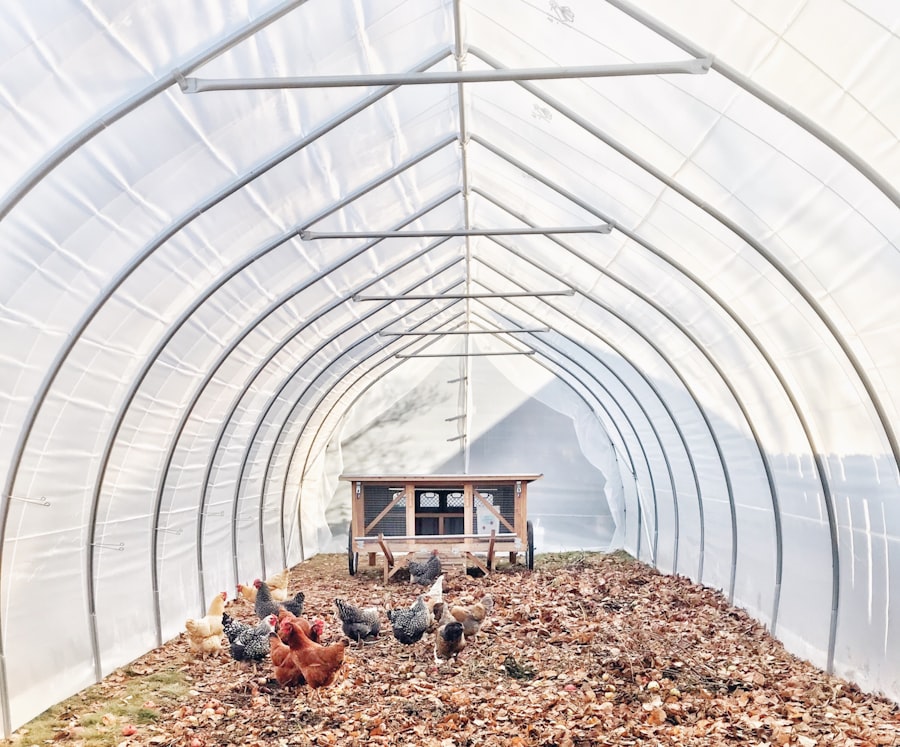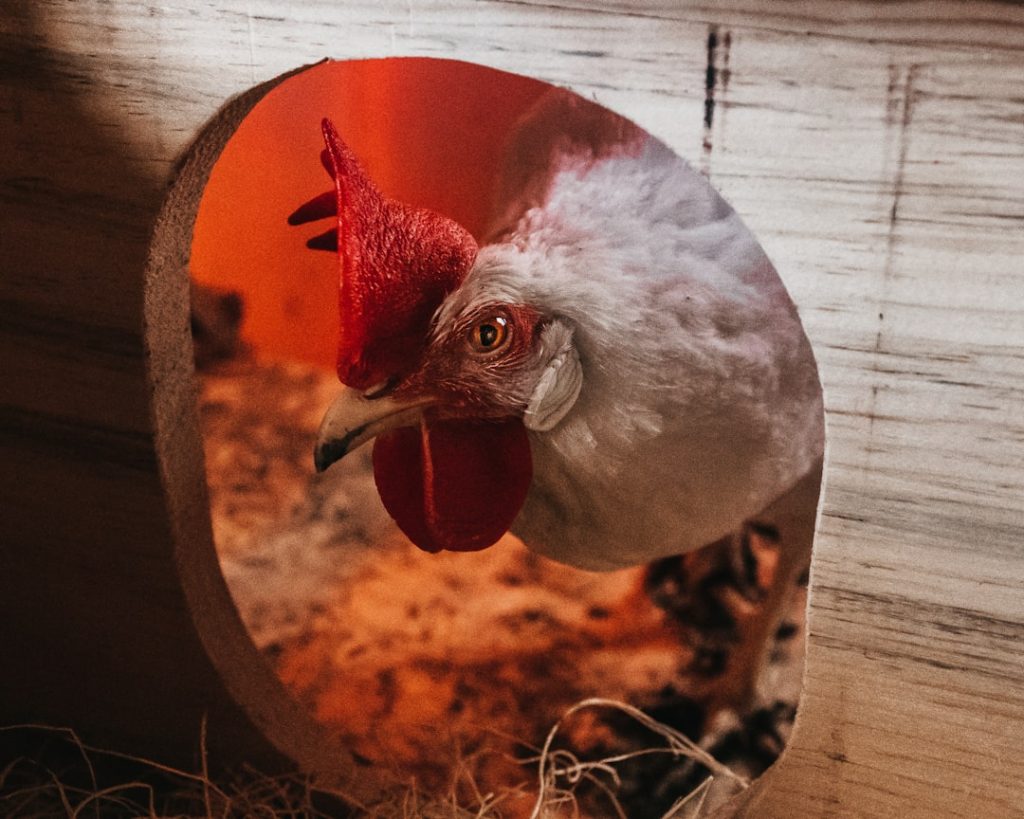Chicken coops serve as essential structures for both hobbyist and commercial poultry keepers. These enclosures provide chickens with protection from predators, shelter from adverse weather conditions, and dedicated areas for nesting and roosting. The decision regarding how long to confine chickens to their coop involves careful consideration of multiple factors.
This article examines the behavioral and physiological requirements of chickens, evaluates the advantages and potential risks associated with free-range practices, and offers guidance on safely allowing chickens to explore outside their coop. By comprehending these aspects, poultry keepers can strike an appropriate balance between coop confinement and free-ranging, ultimately promoting the health and well-being of their flock.
Table of Contents
- 1 Factors to Consider When Determining How Long to Keep Chickens in the Coop
- 2 Understanding the Behavioral and Physical Needs of Chickens
- 3 Benefits of Allowing Chickens to Free Range
- 4 Risks and Dangers of Allowing Chickens to Free Range
- 5 Tips for Safely Allowing Chickens to Free Range
- 6 Finding the Right Balance for Keeping Chickens in the Coop
- 7 FAQs
- 7.1 What is the recommended time to keep chickens in the coop?
- 7.2 How long can chickens stay in the coop without free-ranging?
- 7.3 What are the potential risks of keeping chickens in the coop for too long?
- 7.4 How can I ensure the well-being of chickens kept in the coop?
- 7.5 What are the benefits of allowing chickens to free-range outside of the coop?
Key Takeaways
- Keeping chickens in the coop provides a safe and controlled environment for them to live and lay eggs.
- Factors to consider when determining how long to keep chickens in the coop include space, weather, and predator protection.
- Understanding the behavioral and physical needs of chickens is important for their overall well-being and productivity.
- Allowing chickens to free range can provide them with exercise, access to natural food sources, and mental stimulation.
- Risks and dangers of allowing chickens to free range include predation, exposure to toxins, and potential for getting lost.
Factors to Consider When Determining How Long to Keep Chickens in the Coop
Coop Size and Design
The size and design of the coop play a crucial role in determining the amount of time chickens should spend inside. A spacious coop with ample room for roosting, nesting boxes, and perches can accommodate chickens for longer periods without causing stress or overcrowding.
Flock Dynamics and Chicken Characteristics
The number of chickens in the flock, as well as their age and breed, should be taken into account when determining coop time. Overcrowding can lead to aggressive behavior, increased risk of disease, and decreased egg production. Younger chickens may require more space to exercise and explore, while certain breeds are more suited for confinement than others.
Environmental Factors
The climate and weather conditions in your area should also be considered. Harsh winters or extreme heat can limit the amount of time chickens can safely spend outside, making it necessary to keep them in the coop for longer periods.
Striking a Balance
On the other hand, it’s essential to balance coop time with outdoor access to ensure the overall well-being of the flock. Chickens have natural instincts to forage, dust bathe, and explore their surroundings, which are essential for their physical and mental health. Finding the right balance between coop time and free range time is crucial for maintaining a healthy and happy flock.
Understanding the Behavioral and Physical Needs of Chickens

Understanding the behavioral and physical needs of chickens is essential for providing them with a suitable living environment. Chickens are social animals that thrive in a flock setting, so it’s important to provide them with enough space to move around and interact with each other. Additionally, chickens have natural instincts to scratch, peck, dust bathe, and forage for food.
These activities are not only essential for their physical health but also for their mental stimulation. Therefore, a coop should be designed to accommodate these natural behaviors, with features such as perches, nesting boxes, and access to outdoor space. In terms of physical needs, chickens require a balanced diet, access to clean water, and protection from extreme weather conditions.
A well-designed coop should provide adequate ventilation to prevent heat stress in the summer and drafts in the winter. Additionally, nesting boxes should be provided for hens to lay eggs in a safe and comfortable environment. Roosting bars are also essential for chickens to perch at night, as it mimics their natural instinct to roost in trees for safety.
By understanding and addressing the behavioral and physical needs of chickens, you can create a coop environment that promotes their overall well-being.
Benefits of Allowing Chickens to Free Range
Allowing chickens to free range offers numerous benefits for both the chickens and their owners. Free-ranging chickens have access to a diverse range of plants, insects, and other natural food sources that contribute to a more varied and nutritious diet. This can result in healthier eggs with richer yolks and more flavorful meat.
Additionally, free-ranging allows chickens to engage in natural behaviors such as scratching, pecking, dust bathing, and foraging, which are essential for their physical and mental well-being. The exercise and stimulation provided by free-ranging can also reduce stress and aggression within the flock. Furthermore, free-ranging chickens can contribute to pest control by consuming insects and pests that may be present in the surrounding area.
This natural form of pest management can reduce the need for chemical pesticides and promote a healthier ecosystem. Additionally, allowing chickens to roam freely can benefit the soil by aerating it with their scratching and fertilizing it with their droppings. This can improve soil health and fertility over time, making it more suitable for gardening or other agricultural purposes.
Risks and Dangers of Allowing Chickens to Free Range
While there are many benefits to allowing chickens to free range, there are also risks and dangers that should be considered. Predators such as foxes, raccoons, hawks, and dogs pose a significant threat to free-ranging chickens. Without proper protection and supervision, chickens are vulnerable to attacks from these predators, which can result in injury or loss of life.
Additionally, free-ranging chickens may be at risk of contracting diseases from wild birds or other animals that they come into contact with. Avian influenza, Newcastle disease, and other contagious illnesses can spread quickly among a flock if proper biosecurity measures are not in place. Furthermore, free-ranging chickens may cause damage to gardens, flower beds, and other landscaping features.
Their scratching behavior can uproot plants and disturb soil, while their droppings may create sanitation issues in certain areas. Additionally, free-ranging chickens may wander onto neighboring properties or roadways, posing a risk of conflict with neighbors or traffic accidents. These risks should be carefully considered when deciding whether to allow chickens to free range.
Tips for Safely Allowing Chickens to Free Range

Securing the Free-Range Area
First and foremost, it’s essential to secure the perimeter of the free-range area with fencing or other barriers to deter predators and prevent chickens from wandering into unsafe areas. Additionally, providing adequate supervision during free-ranging time can help mitigate risks and respond quickly to any potential threats or issues that may arise.
Biosecurity and Health Measures
Implementing biosecurity measures such as regular health checks, vaccinations, and parasite control can help reduce the risk of disease transmission among free-ranging chickens. Additionally, providing a designated dust bathing area within the free-range space can help minimize soil disturbance in other areas.
Maintaining Positive Relationships and Reducing Damage
Furthermore, communicating with neighbors about your free-ranging chickens and addressing any concerns they may have can help maintain positive relationships within the community. Lastly, providing enrichment activities such as hanging treats or toys can help keep free-ranging chickens engaged and reduce the likelihood of them causing damage to gardens or other areas.
By implementing these tips and strategies, you can safely allow your chickens to free range while minimizing potential risks and dangers.
Finding the Right Balance for Keeping Chickens in the Coop
In conclusion, finding the right balance for keeping chickens in the coop involves careful consideration of various factors such as coop size, flock size, age and breed of chickens, climate conditions, behavioral and physical needs of chickens, as well as the benefits and risks of allowing them to free range. By understanding these aspects and implementing appropriate measures, you can create a living environment that promotes the health and happiness of your flock while minimizing potential risks. Ultimately, every chicken owner must find a balance that works best for their specific circumstances and priorities.
Whether you choose to keep your chickens primarily in the coop or allow them to free range regularly, it’s important to prioritize their well-being while also considering practical concerns such as predator protection and community relations. With careful planning and attention to detail, you can create a living environment that meets the needs of your flock while also providing peace of mind for yourself as a chicken owner.
If you’re wondering how long you should keep chickens in the coop, you may also be interested in learning about large chicken coop ideas. This article provides helpful tips and inspiration for creating a spacious and comfortable living space for your feathered friends. It’s important to consider the size and design of the coop to ensure that your chickens have enough room to move around and stay healthy.
FAQs
What is the recommended time to keep chickens in the coop?
The recommended time to keep chickens in the coop is overnight and during periods of extreme weather, such as heavy rain, snow, or high winds.
How long can chickens stay in the coop without free-ranging?
Chickens can stay in the coop without free-ranging for a few days, but it is important to provide them with enough space, ventilation, and enrichment to prevent stress and boredom.
What are the potential risks of keeping chickens in the coop for too long?
Keeping chickens in the coop for too long can lead to stress, boredom, aggression, and health issues such as obesity and feather picking. It is important to provide chickens with access to outdoor space for exercise and natural behaviors.
How can I ensure the well-being of chickens kept in the coop?
To ensure the well-being of chickens kept in the coop, provide ample space, natural light, ventilation, nesting boxes, perches, and enrichment such as dust baths and toys. Regularly clean the coop and monitor the chickens for signs of stress or health issues.
What are the benefits of allowing chickens to free-range outside of the coop?
Allowing chickens to free-range outside of the coop allows them to engage in natural behaviors such as foraging, dust bathing, and socializing. It also provides them with access to a diverse diet and natural sunlight, which can contribute to their overall health and well-being.
Meet Walter, the feathered-friend fanatic of Florida! Nestled in the sunshine state, Walter struts through life with his feathered companions, clucking his way to happiness. With a coop that’s fancier than a five-star hotel, he’s the Don Juan of the chicken world. When he’s not teaching his hens to do the cha-cha, you’ll find him in a heated debate with his prized rooster, Sir Clucks-a-Lot. Walter’s poultry passion is no yolk; he’s the sunny-side-up guy you never knew you needed in your flock of friends!







